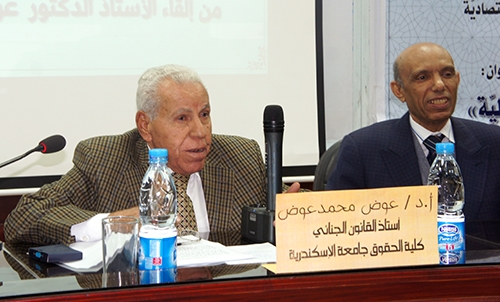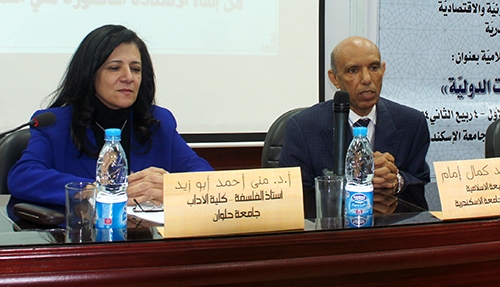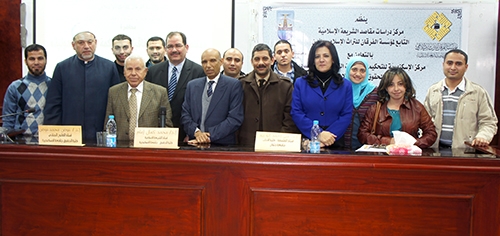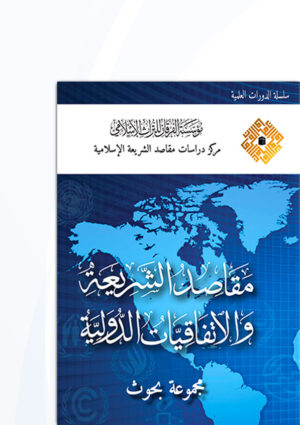Pursuant to the clauses of the Memorandum for Co-operation, the Centre for the Study of the Philosophy of Islamic Law at Al-Furqān, in co-operation with Alexandria Centre for Arbitration and Legal and Economic Services at the Faculty of Law - University of Alexandria, organised the Seventh Training Course on Maqāṣid al-Sharīʿah (objectives of Islamic law), under the title “The Objectives of Islamic Law and the International Agreements”.The course was held at the Ahmed Zaki Yamani Theatre at the Faculty of Law, the University of Alexandria, between the 9th and 14th of February 2013.

Delivered by a renowned team of specialists of Sharīʿah and law, it was well received by twenty five participants made up of researchers, post-doctoral candidates and faculty members from an array of Egyptian, Algerian and Libyan universities.
On behalf of Al-Furqān Foundation, Mr. Mohamed Drioueche, Head of the Foundation’s Projects and Publications Department, attended the opening session alongside the Dean of the Faculty of Law, Prof. Dr. Ahmed Hindi, and Prof. Dr. Mohammed Kamal Imam, professor of Sharīʿah at the Faculty. Mr. Mohamed Drioueche began the proceedings welcoming the guests, professors and management of the Faculty and expressed his admiration for the co-operation shown by the Alexandria Centre for Arbitration and Legal and Economic Services. He outlined the intention behind running the course in laying the foundations for a systematic maqāṣidi approach (an approach based on the objectives of Islamic law) to local and international challenges, in order to ameliorate a cohesive position that can be presented, at state level, vis-à-vis those elements of western institutional hegemony that effect many policy making centres which, as a consequence, set and advocate one sided interpretations to international agreements. These centres, in being prone to such hegemony, have unfortunately, not provided for a fair reference point which best serves to protect individual freedom, the sovereignty of nations and play a fair and effective role towards fulfilling the common interests of humankind. To this end, he explicated how the maqāṣidi approach could provide a suitable, well informed articulation of Islamic juridical positions towards international agreements.
On behalf of the Faculty of Law, Prof. Dr. Ahmed Hindi, the Dean of the Faculty, welcomed the guests. In his presentation he emphasised the willingness of the Faculty for greater co-operation and a strengthening of ties between the two institutions, pointing to instances of success that have come as a result of such co-operation.

The specialist course then began with a lecture by Prof. Dr. Kamal Imam titled “The Objectives of Sharīʿah and Sharīʿah Based Politics”, which focused on the topics of international agreements and maqāṣid al-Sharīʿah (objectives of Islamic law). It explicated the relationship between the two elements of maqāṣid al-Sharīʿah and political aspects of the Sharīʿah. It also detailed the relationship between maqāṣid and Islamic textual references.
Also considered were a number of contemporary marriage contracts with a discussion of the maqāṣid (objectives of Islamic law) stance towards them; this included an analysis of the position taken by Islam towards the protection of women from discrimination. Also discussed were the qualifications required for the ratification of any international agreements, specifically in their being free from any contradictions with Islamic axioms.
A number of international agreements and treaties and the risks they posed to societies, was then examined. The course studied human rights and their underlying principals as found within both the Sharīʿah and international agreements. As the course progressed, articles of international trade agreements were debated and critiqued from a maqāṣidi perspective (a perspective based on the objectives of Islamic law), with careful consideration given to the ramification of each and the extent by which they served the interests of Muslim countries and whether such interests fell within the framework of a maqāṣidi philosophy (a philosophy based on the objectives of Islamic law).
Also considered was the work being conducted by the International Criminal Court from an Islamic Sharīʿah perspective, the juridical opinion towards entering into agreements related to this institution and the Islamic ruling towards the crimes that fall within the area of competence of this Court.
The place of Islamic Sharīʿah in international law was then discussed – Sharīʿah being the third source for such law.
Agreements related to the non-proliferation of nuclear armaments were considered from the view point of the protection of individuals and their wealth, two key elements of maqāṣid (objectives of Islamic law).
A maqāṣidi reading (a reading based the objectives of Islamic law) of the Egyptian-Israeli peace agreement which included a study of its articles was presented and included discussions on the reasons for its instatement and the strategic change that it brought about.
The place of environmental protection in light of Islamic Sharīʿah and the maqāṣidi dimension (based the objectives of Islamic law) of such protection was also studied. This included examples of laws that jurists had passed to facilitate such said protection. This also considered methods and mechanisms available to afford such protection within both the Sharīʿah and those found within international agreements.
The course also presented a number of māqasidi studies (objectives of Islamic law) from the publication “Al-Dalīl al-Irshādī”, which provided methods to legitimately reconcile Islamic laws with international agreements in areas of human rights, women’s issues, minority challenges, intellectual property, trade agreements and agreements pertaining to environmental protection.

The closing ceremony, on the 14th of February 2013, saw the delivery of certificates to participants, who, on their part, thanked Sheikh Ahmed Zaki Yamani, Chairman of the Al-Furqān Foundation, for his generous support of the course. They also thanked the members of the Managing Board, the Board of Experts and the employees of the Foundation.


